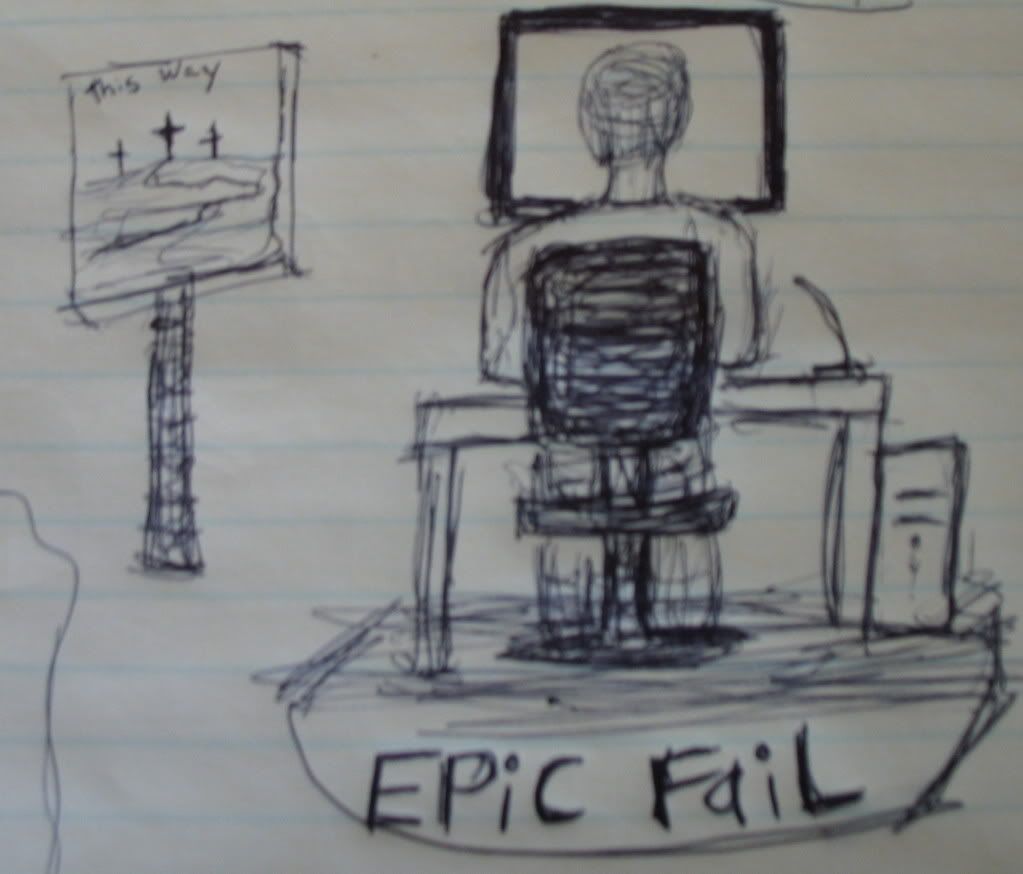It was all so disgustingly vulgar to a Greco-Roman culture that had not the slightest qualms about saying that some — indeed most — people were naturally inferior.
Pagans came by this notion honestly, because the whole conception of human beings as “equal” owes its entire existence to the Judeo-Christian tradition and absolutely nothing else. It is pure mysticism based solely and exclusively on Genesis and related biblical texts. (Christian Sanity)
Wednesday, April 30, 2008
“hold these truths to be self-evident"
This is a very interesting article by Mark Shea. Here is a quote...
Sunday, April 27, 2008
Belief in Free Will and Responsibility
This is a interesting experiment. It doesn't prove that we have free will. It does show that our beliefs have consequences. (profound I know) I think this is also related to categorizing addictions as a disease. I would bet that doing this makes someone more likely to continue in their addiction.
“We found that the more we reduced their belief in free will, the more they cheated.”
In the first test, conducted at the University of Utah, students were asked to read one of two passages by Nobel Prize-winning scientist Francis Crick. In the first, “he basically undermines belief in free will,” Schooler said. In the second, the subject does not come up.
The students were then asked to calculate the answers to a series of mathematical problems. They were told that, due to a programming glitch, the correct answer would appear on their computer screens as they were attempting to solve each equation. They were instructed to hit the space bar as soon as the answer appeared on the screen, which would cause it to disappear.
Which group was more honest? There wasn’t any contest. Students who read the anti-free-will essay were 45 percent less likely to press the space bar and thereby avoid cheating. Challenging their notion of personal control had immediate, and unwelcome, results. (Via this link)
Wednesday, April 16, 2008
Dick to the Dawk to the Ph.D.
In posting this, I'm not denying natural selection but I think it is making a great point. It also has the benifit of being hilarious.
Monday, April 14, 2008
The Over Reach of Neuro-(whatumacallit)
Two quotes on the over reaching of Neuro-(whatumacallit)
QUOTE 1:
QUOTE 2:
I'm not dissing science here just it's over simplification.
QUOTE 1:
That is why one would expect critics to be on the side of the poets, with their sense of this complexity, rather than siding with the terribles simplificateurs of scientism. A. S. Byatt’s neural approach to literary criticism is not only unhelpful but actually undermines the calling of a humanist intellectual, for whom literary art is an extreme expression of our distinctively human freedom, of our liberation from our organic, indeed material, state.Link
QUOTE 2:
While the sudden visibility of the brain is indeed remarkable, the greater significance is perhaps more symbolic. Brain images are still far cruder than one would think after reading the sensational revelations attributed to them in the science pages of newspapers and magazines. And it must be remembered that these are secondary images of blood flow and glucose in the brain, and not of brain tissue itself. We seem to forget that it is not as if a camera were entering the brain and taking pictures of what is going on. At this point, the most that can be said is that brain imaging indirectly and very broadly measures the activity of groups of thousands of neurons when the brain is engaged in a physical or mental task. While there are some correlations between brain activity in certain regions and external, observable behavior, it is very hard to gauge what the pictures really mean. How does the flow of blood in parts of the brain correspond to feelings, moods, opinions, emotions, imagination? It remains a daunting task to create theories to “operationalize” what is going on underneath all the pretty pictures.
The state of the art right now is that we can read brains—to some very crude extent—but we can’t even begin to read minds. Wall Street Journal science writer Sharon Begley has coined the term “cognitive paparazzi” to describe those who claim they can. “What does neuroscience know about how the brain makes decisions? Basically nothing,” says Michael Gazzaniga, director of the SAGE Center for the Study of the Mind at the University of California, Santa Barbara. LINK
I'm not dissing science here just it's over simplification.
Subscribe to:
Posts (Atom)




